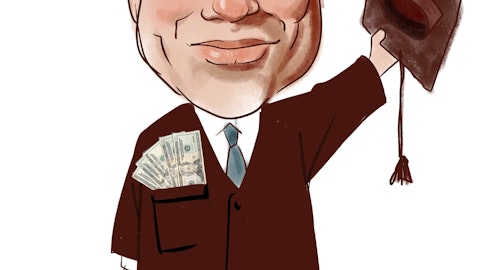With Bill Ackman now gone from J.C. Penney Company, Inc. (NYSE:JCP), investors may be inclined to bet on a turnaround. Since Ackman championed the hiring of Ron Johnson (who put the company in its current predicament), his exit could allow the retailer to get back to its old ways.
Unfortunately, while the old J.C. Penney Company, Inc. (NYSE:JCP) may have been profitable, it was far from a great company. Department-store stocks in general have not performed well in recent months, and Ackman isn’t the only big-name investor that could be looking to sell.
Ron Johnson was hired for a reason
In a recent letter to his investors, Ackman notes that he wasn’t the only one pushing for Ron Johnson; rather, the decision to hire the former Apple retail guru was unanimous among J.C. Penney Company, Inc. (NYSE:JCP)’s directors. It’s worth remembering the state J.C. Penney Company, Inc. (NYSE:JCP) was in prior to Johnson’s hiring.
Ackman’s fund, Pershing Square, gave a presentation about the company in early 2011. Pershing Square noted that sales per square foot were down to 2002 levels, while the stock traded at a discount to its peers.
A year later, (then newly CEO) Johnson gave his own presentation about J.C. Penney Company, Inc. (NYSE:JCP). He noted that J.C. Penney Company, Inc. (NYSE:JCP) had one of the oldest and poorest base of customers, and that the department- store business in general was in decline.
Department stores haven’t been great performers
Johnson also remarked that, over the past 20 years, department-store market share had declined by roughly 26%. More recently, department-store stocks haven’t made great investments.
Analysts at Morgan Stanley downgraded Kohl’s Corporation (NYSE:KSS) back in March to Underweight, then reiterated that downgrade in May. In August, Kohl’s reported earnings that showed a decline from the prior year, and cut its guidance for all of 2013.
That trend may have just been company-specific, but Macy’s, Inc. (NYSE:M) hasn’t fared much better.
Although Macy’s, Inc. (NYSE:M) shares have outperformed the S&P since the start of 2012, recent trends have not been positive. Macy’s, Inc. (NYSE:M), too, reported a disappointing quarter in August, and then cut its guidance for the year. Analysts at Maxim Group cut Macy’s, Inc. (NYSE:M) rating to a Hold with a $48.50 price target.
On the company’s earnings call, Macy’s CFO blamed its struggles on the state of the consumer. What money consumers do have, they appear to be spending on goods that department stores don’t sell — cars, housing, and home improvement. In light of the recent weakness in teen retail, those remarks appear plausible.
Will Perry Capital and Vornado also sell?
Besides widespread weakness in the department-store business, J.C. Penney shares could be under further selling pressure. It’s worth remembering that Pershing Square wasn’t the only investment firm pushing for a change: Vornado Realty Trust was working alongside Ackman.
Vornado sold 10 million shares in March, but that was only about half of its position. Vornado still owns a sizable chunk of J.C. Penney, and Vornado’s chairman Steven Roth remains a J.C. Penney director.
Likewise, Perry Capital is also a big holder of J.C. Penney shares. During the fight between Ackman and the rest of J.C. Penney’s board, Perry Capital bought 7.3% of the company, then sent a letter to the board supporting Ackman’s vision.
Given that Ackman is now out of the picture, it’s unlikely that Perry Capital will get what it wants. At the same time, Vornado could look to sell its remaining stake in the retailer.
Investing in J.C. Penney
At these levels, J.C. Penney might look like a bargain. Before Ackman bought in, J.C. Penney was trading near $20 per share. If CEO Mike Ullman can bring the retailer back to that level, shares have a 35% upside.
The problem is that the department-store business in general is challenged. Both Kohl’s and Macy’s have disappointed investors, drawing into question the overall strength of the consumer.
At the same time, Ackman wasn’t the only investor that bought a big stake in J.C. Penney. Vornado, as well as Perry Capital, supported Pershing Square’s vision, at least at one point in time. Though they may have changed their minds, it wouldn’t be unreasonable to think they could sell their stakes as well.
For those reasons, J.C. Penney continues to remain a highly speculative investment.
The article J.C. Penney Is No Better off Without Ackman originally appeared on Fool.com is written by Sam Mattera.
Sam Mattera has no position in any stocks mentioned. The Motley Fool has no position in any of the stocks mentioned.
Copyright © 1995 – 2013 The Motley Fool, LLC. All rights reserved. The Motley Fool has a disclosure policy.






